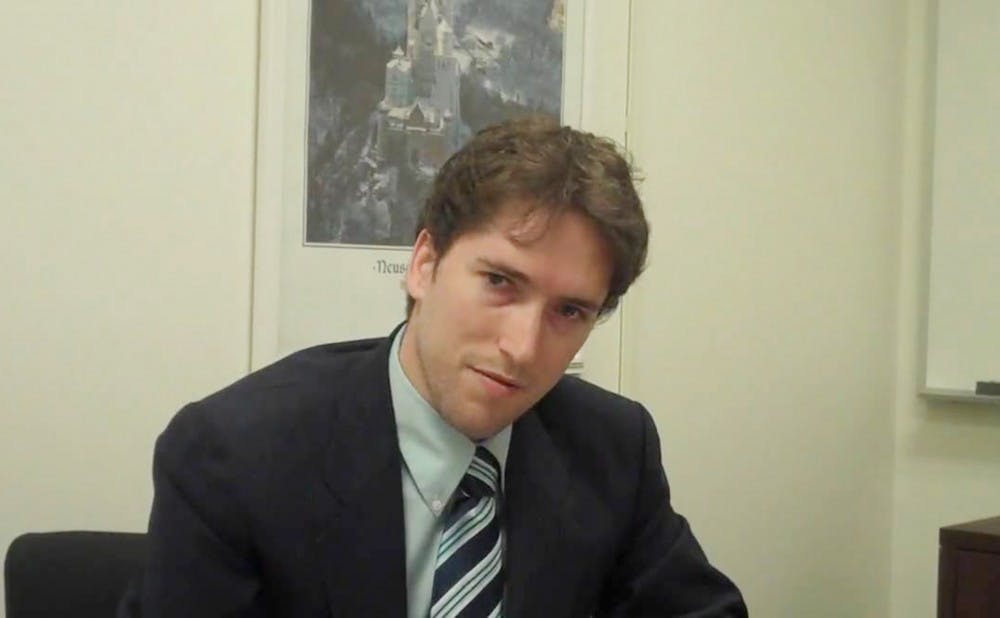Darren Beattie, Ph.D. '16 and visiting instructor of political science, predicted at a political science department gathering Nov. 2 that Donald Trump would win the presidential election. Beattie was also a signatory on a list of "Scholars and Writers for Trump," who endorsed the candidate. The Chronicle’s Likhitha Butchireddygari corresponded with Beattie to discuss how he was able to foresee Trump's victory and what a Trump presidency will look like.
The Chronicle: Why did you think Trump would win despite polling and pundits saying otherwise?
Darren Beattie: I thought Trump would win as early as July of last year. There are various signals that someone really attuned to politics knows to look for. One of the signals for me is when Trump made his provocative remarks on immigration and then refused to apologize in the wake of overwhelming corporate and media opposition. Let me be very clear: This does not mean that I like the way he phrased his remarks. My point is that his willingness to take a position on immigration so antithetical to corporate Republican donors and then not be cowed by the usual shaming tactics reflected early on a certain independence and flexibility that led me to think we're dealing with a very different type of candidate than we're used to. There are other signals like this, but I can't get into them all.
Trump's position on immigration (apart from his provocative word choice) is in many ways very close to [Democrat Bernie] Sanders' before Sanders compromised to the Democratic National Convention. Check out Sanders' "Vox" interview with Ezra Klein, for example. More important, let me say a few words about polling and pundits. One thing about pundits and "experts" that readers have to understand is that they are not paid to make accurate predictions or give accurate analysis; they are paid to give predictions and analysis that advance a particular agenda, usually the agenda of some billionaire benefactor or corporate media platform. This is a powerful explanation because it accounts for how most of these people can be utter failures and somehow keep their jobs. Just watch, now a lot of these people who were wrong about everything will be asked their "expert opinion" on how and why they went wrong! Some of the "experts" who criticized Trump's foreign policy are "experts" solely by virtue of being involved in one of the biggest foreign policy disasters of our nation's history—the Iraq War. It would be hilarious if it weren't so pathetic. For the academic pollster types, the situation is still more pitiful because they're not even getting rich off of their wrong predictions.
TC: What does the Trump victory mean for America in this point in history? If you had to describe the country as going through an era of ____, how would you fill in the blank?
DB: This is a global phenomenon in the sense that it emerges out of a political dynamic that extends to Western Europe. Fundamentally, I think what we're seeing is a referendum on globalization as it has been practiced over the past 30 years. Watch out for similar upsets in Germany, France, Netherlands, etc.
TC: Will Trump be more moderate now that he has won the presidency? How many of his proposals will go into law, do you think?
DB: I think we need to unpack [the] word "moderate" a bit. I like to make a strong distinction between "centrist" and "mainstream." Centrist in my view is pretty much in the center of what most people in the country actually believe; "mainstream" refers to positions promoted by the corporate media and academic opinion. Trump's success, I think, points to the difference between centrist and mainstream. I do think we will see a change in Trump's tone. I think all of his most significant proposals will become law. Keep in mind that for a lot, all he has to do is repeal executive orders.
TC: Before Trump chose Mike Pence, it was reported that he told John Kasich that he would put him in charge of "domestic and foreign policy" if Kasich accepted the vice president spot. Will Pence be given the same agency?
DB: Kasich's foreign policy, like Kasich's campaign, is totally foolish. Pence has been a great asset for Trump in the campaign and has evolved in his foreign policy views. I do not think he will be the main source of Trump's foreign policy thinking, however.
TC: Trump is not a career politician. Do you think he will be acting to be re-elected?
DB: Seriously? Of course Trump will act to get re-elected. Whether he will get elected will depend on how serious and effective he is in following through with the most important campaign promises. I'm optimistic but prepared to be critical when necessary.
Editor's note: The Chronicle spoke with Beattie via email.
Get The Chronicle straight to your inbox
Signup for our weekly newsletter. Cancel at any time.
Class of 2019
Editor-in-chief 2017-18,
Local and national news department head 2016-17
Born in Hyderabad, India, Likhitha Butchireddygari moved to Baltimore at a young age. She is pursuing a Program II major entitled "Digital Democracy and Data" about the future of the American democracy.

